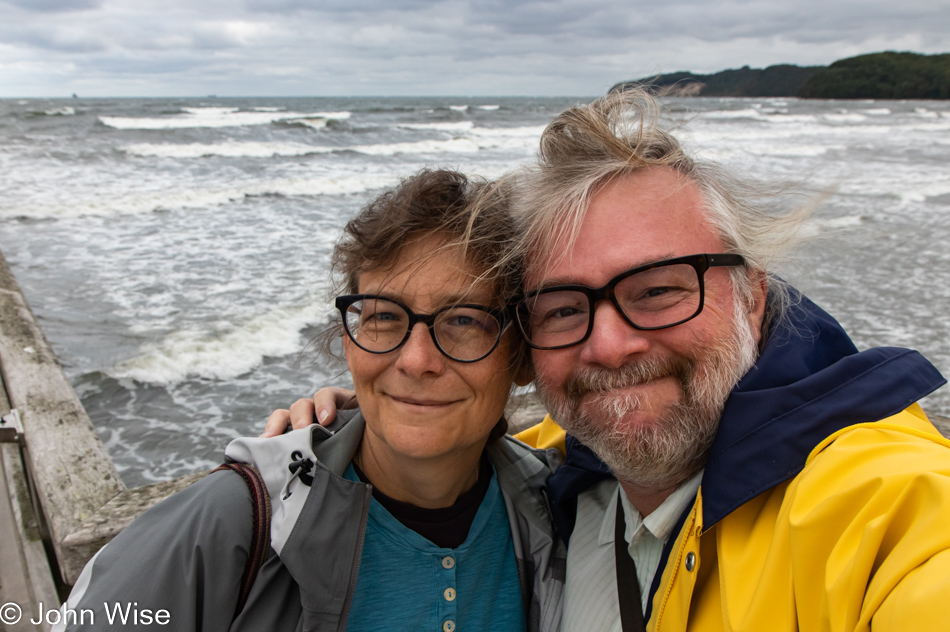
It’s a couple of degrees colder than the previous days, and it’s windy. Breakfast was once again at the same bakery as yesterday, Junge Die Bäckerei (Die in German is “The”). We had to eat there as they have the greatest Brötchen EVER in the form of a whole grain hazelnut roll; it’s just incredible and super satisfying, biting into whole pieces of hazelnuts under a slathering of butter and apricot jam.
With some time to spare after breakfast and returning to our hotel to settle the bill, this is a manual face-to-face process only available when the front desk is open from 8:00 until 7:30, and then we went for a walk over to the sea to look at the fury of the Baltic as it’s whipped by the wind.
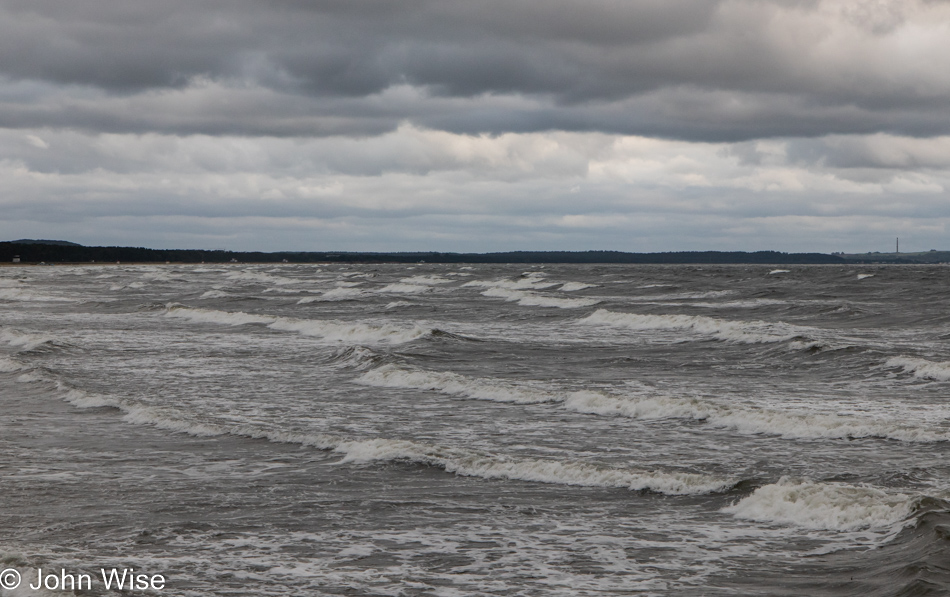
Last night at the fish stand, we talked with a young guy who took our order and shared what it’s like to live in Binz: one word: boring. He said it’s expensive to live here and that you are lucky if you earn 10 cents an hour more than in other places. I suppose this is why so many of the staff we ran into clearing tables, cleaning rooms, and taking orders were Polish; it’s easier to make them shoulder the high cost of living while making more money than they can make in their own country that we’re so close to right now.
This came out as we asked about the quiet season, figuring the winter would be too harsh here to support much tourism. He responded that while that is mostly true, the town is booked this winter due to pent-up demand from people itching to get out during the pandemic. I have to admit to a curiosity about what this town is like as Arctic cold descends and the freezing sea chomps at the shore.

Good thing we had time to spare as while we walked up the street to the train station, I was saying that nothing looked the same. Shortly before arriving at the Kleinbahnhof (small train station), I insisted Caroline look for the Hauptbahnhof (main train station), and sure enough, this didn’t look familiar because we were going to the wrong station. We turn around and start eating that spare time we thought we had as we have 20 minutes of walking to get to the station where our train leaves in 30.
Once at the station, we have to deal with a schedule that doesn’t show us the train we need to Stralsund running for another hour. There is a train that’s running to Lietzow from which it looks like we can transfer and get to Stralsund, so we buy tickets for it and hope for the best. On the train to Lietzow, the guy checking our tickets informs us that this RE9 train auto-magically becomes the RE1609, so we just need to stay where we are. Why didn’t the automat show us this fact? And, of course, with this being a small town, there was no one working at an information booth.
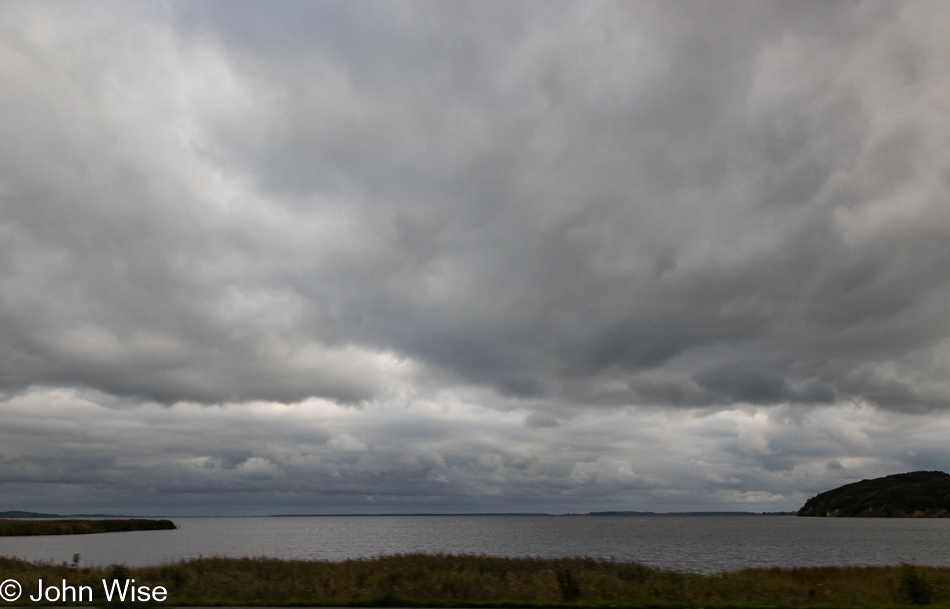
Leaving Rügen about to reach Stralsund for a quick transfer to the RE3 train to Berlin.
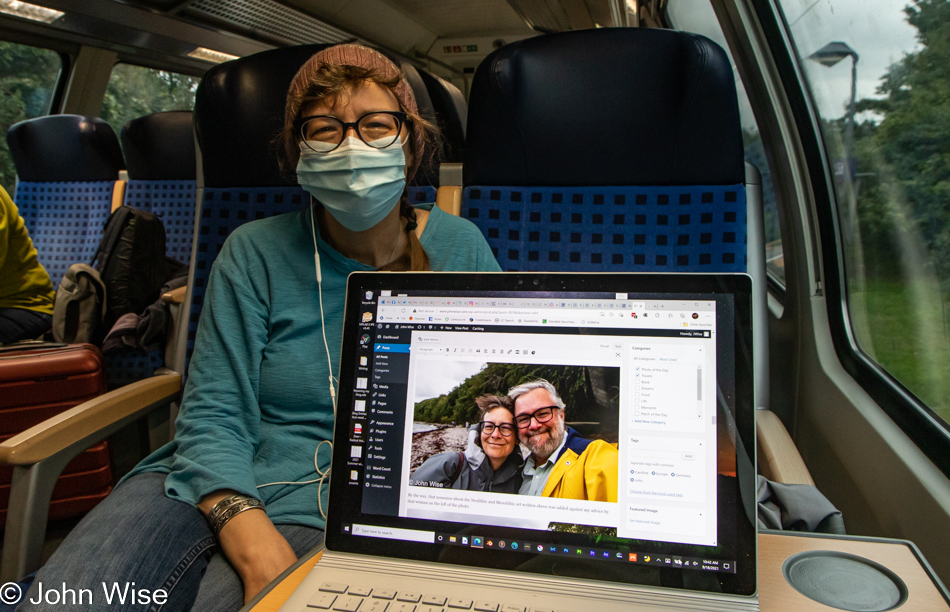
Finally, on our way to Berlin. We chose to leave the island two hours early as the day we came in; our train was running late and stopped a few times to wait for other trains to transfer their passengers. We only had 8 minutes in Berlin to jump on a train to Erfurt, where we only had 6 minutes before another train left via Stuttgart that would bring us to Frankfurt.
We didn’t learn on our trip to Stralsund from Berlin that this train doesn’t have food or water on it, though the trip is over 3 hours long. While we have one more hazelnut Brötchen to split between us on our way to Germany’s capital city, we have nothing to drink. When we arrive, we’ll have a couple of hours until our next connection, with the plan being that we find a proper lunch. Knowing us, it’ll be a döner on the go, and why not? Berlin is known for its famous döners.
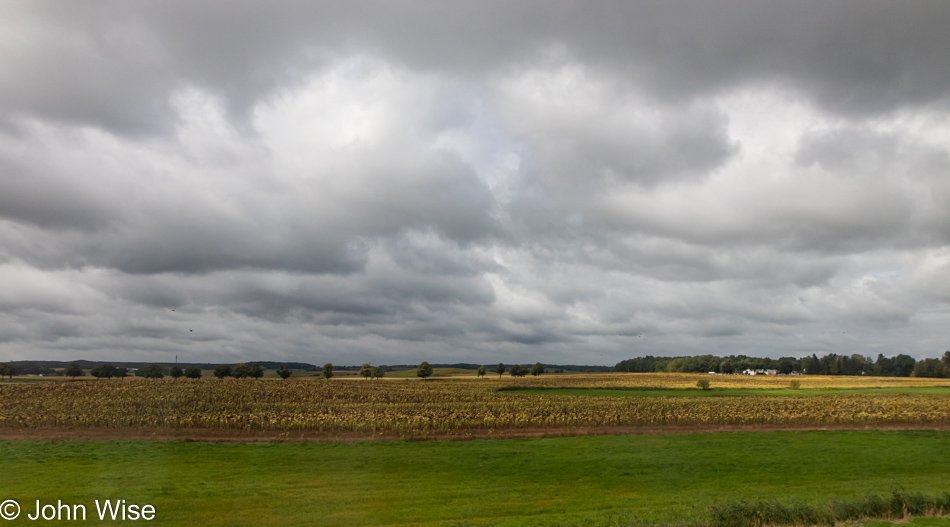
Spots of sun flash by too fast for me to properly photograph them. I want more sun and blue skies to close out this vacation in a vacation.
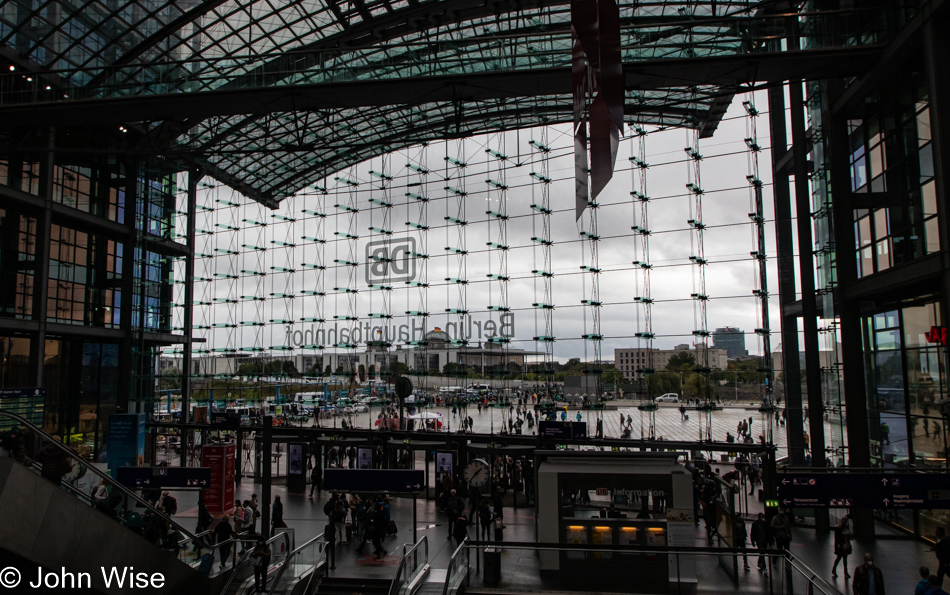
We’ve arrived in Berlin but not in time for the Superbooth synth conference that is ending today. So it goes; hopefully, next year, we’ll return for a normal non-COVID-influenced conference, and all the American vendors will be on hand, too. Now into the city for a moment for some speed sightseeing before grabbing that bite to eat.
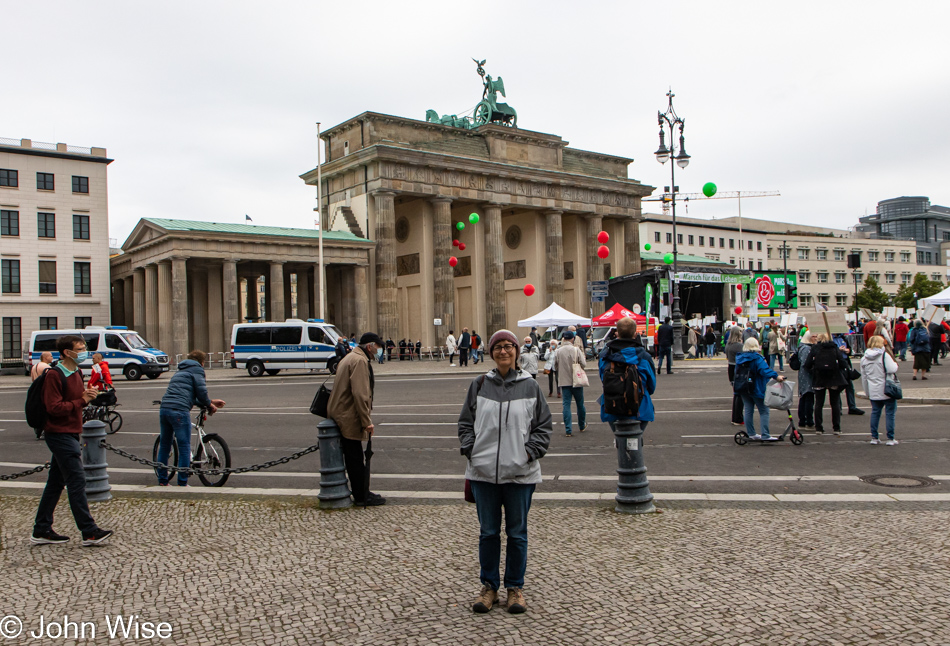
There are police all over this area of the city as multiple demonstrations are going on, and from Caroline’s conversations with law enforcement, it appears they are in force in case protestors show up at one or the other protests where they might clash. Certain that we’re not walking into any confrontations, we head over to Brandenburg Gate, which Caroline hasn’t seen in person since before the Berlin Wall fell.
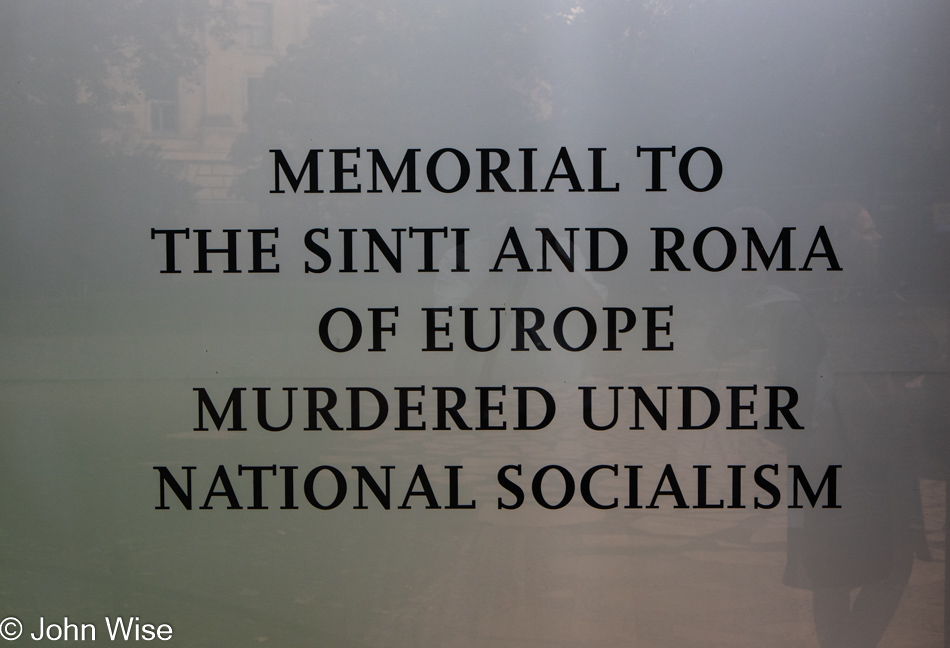
We didn’t have time to walk the extra 800 meters from the Sinti and Roma Memorial to the Jewish Memorial, and this memorial isn’t all that photogenic inside the walls so the sign has to stand in for our taking a moment to recognize all the “Gypsy’s” (not a nice word anymore) who were murdered by the Nazi fuckheads who loved killing everything out of the ordinary. Funny, I just realized that modern Germany, by frowning on diversity and enforcing conformity through browbeating, is, in effect, still fighting things out of the ordinary, only without the death part. Oh shit, Caroline just reminded me that every society or country is practicing this kind of cultural hegemony.
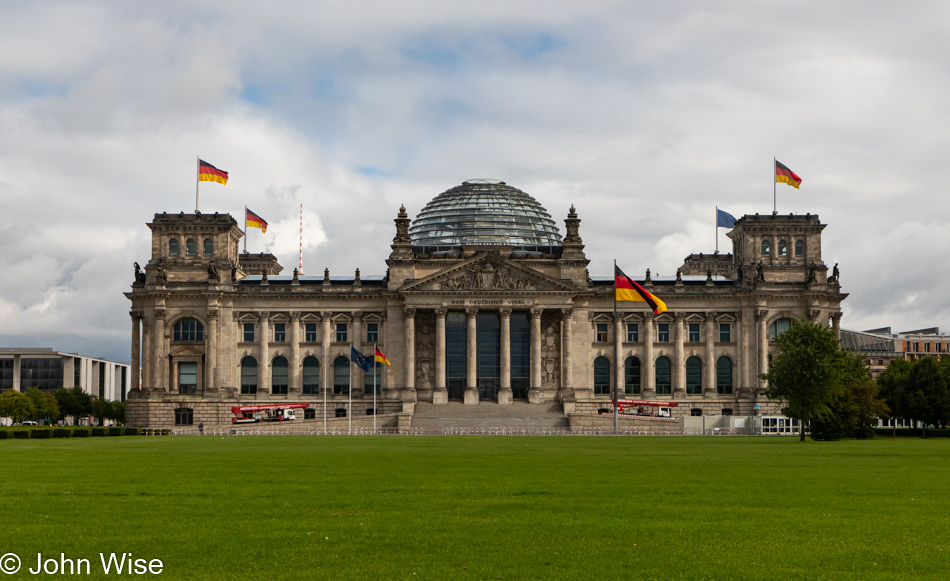
This is the German Parliament, which, in terms of functionality, is similar to America’s Capitol building and is called the Bundestag or Reichstag. While I took a photo of Caroline in front of it from multiple angles, none of them turned out well due to framing distance, fences, or other issues. With three other images of my beautiful wife gracing this page, we’ll have to leave it at that. When Caroline and I left Germany during the previous century, the seat of government was in boring Bonn. The symbolism of the new transparent dome casting sunlight onto the parliament floor is pretty cool in my book.

The Brandenburg Gate and the Berlin TV Tower might be two of the most iconic symbols of this city now that the old dividing wall is long gone.
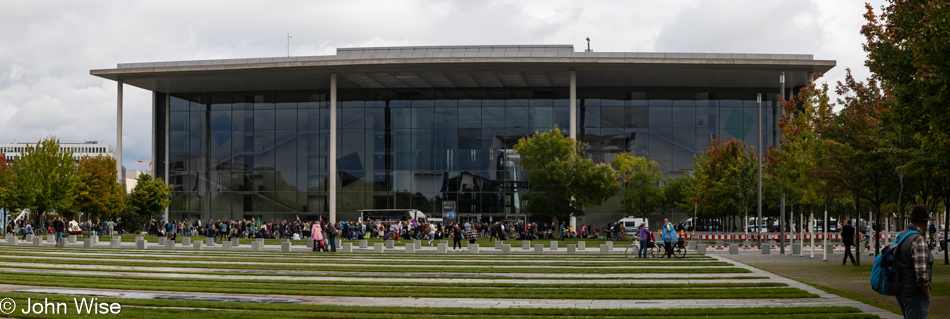
This is the second location of demonstrations we’ve seen starting to form, but we’re keeping well clear of them as if something turns the wrong way, we could easily find ourselves in the middle of a melee that would have us missing our next train. There’s nothing going on in German politics at this time that really concerns us aside from the rise of the right side of the political spectrum, but who could blame Germans when people like Trump, Bolsanaro, Lil Nas X, Orban, Erdogan, Xi, and Putin wield so much influence?

There are many different paths in history, and for the past 76 years, Germany has been on the side of modernization, education, and, to a large extent, diversity. An older generation laments change, and an under-educated lower class listens to how good things used to be and needs someone to blame for their poor standing in society, but instead of shouldering blame due to their own ignorance and recalcitrance to change, they need to scapegoat the many foreigners taking the jobs they don’t want. It’s a similar situation everywhere on earth, such as in America, where our citizens don’t want to kill and process the meat on our table, prosperous Chinese people don’t want their children cleaning toilets, Croats won’t bus tables for crumbs when Bosniaks are at the door begging for jobs, and the list goes on.
Our choices of which paths to take in this age of stupefying change are not simple, nor is it correct in civil society to play people by instilling fear that they are getting screwed by unseen forces such as poor people stealing their futures. The sign above may as well have one pointing to Brexit, another for just sitting back watching Bolsanaro do what he pleases, and the other encouraging Trump to continue harping on the absurdity of stolen elections.
It seems like we are suffering a collective myopic moment in history where uncertainty is tossing us into the path of a speeding train. Maybe we think death is the better alternative as we run away from bogeymen that only exist in the fear machine.
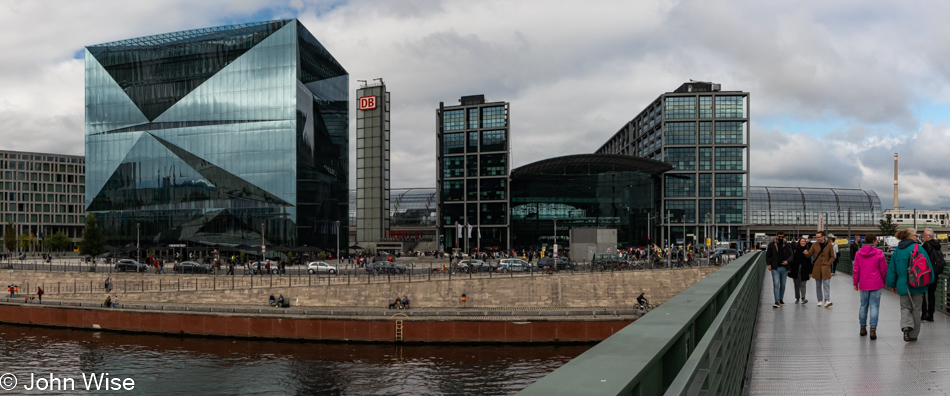
The former German Democratic Republic was run by Walter Ulbricht from 1950 to 1971 when he was dethroned and succeeded by Erich Honecker, who fell with the Wall that divided the two Germany’s, East and West. What these two men had in common was that they let their country rot after World War II in the name of Communism, and instead of working to create a healthy socialist environment, they built police states that turned citizens against citizens while murdering those they felt too dangerous. What this neglect offered the West was the opportunity to tear down the crumbling remnants of a failed state. In its place, Germany is racing to offer an alternative that is rapidly evolving, as evidenced by the healthy display of resistance among the demonstrators who are freely voicing their concerns here in Berlin, where the government must witness the issues important to voters while similar actions happening across the country are relayed to media and politicians.
I would also like to note here that while I’ve poked fun at Honecker, who probably rightly deserves it, I also found that he led a quite interesting, brutal life before entering politics. I hope to carve out some time before our next visit to Berlin to learn more about the regime that ruled the east behind an Iron Curtain.
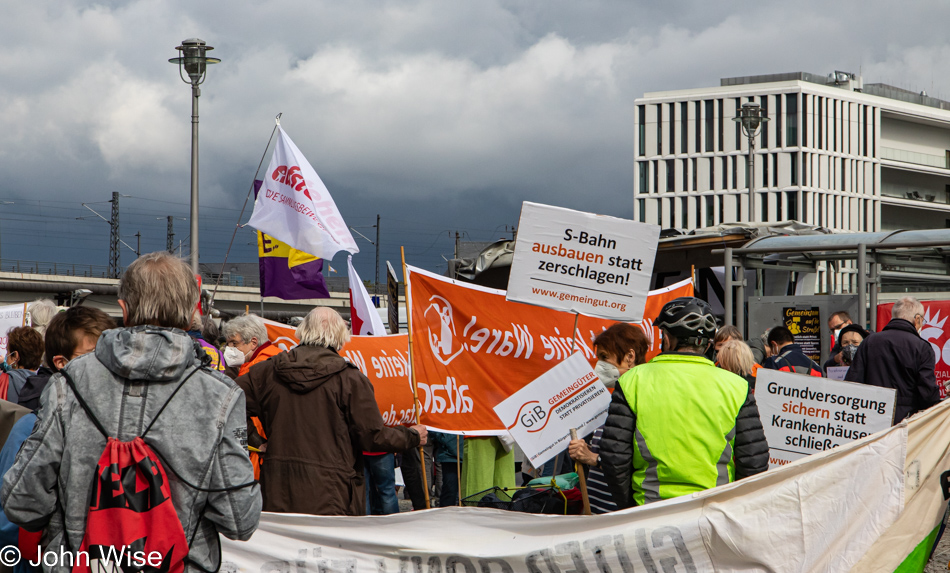
With the elections barely a week away, the push is underway to influence voters about issues the various interest groups who want to be heard are out here rallying for.
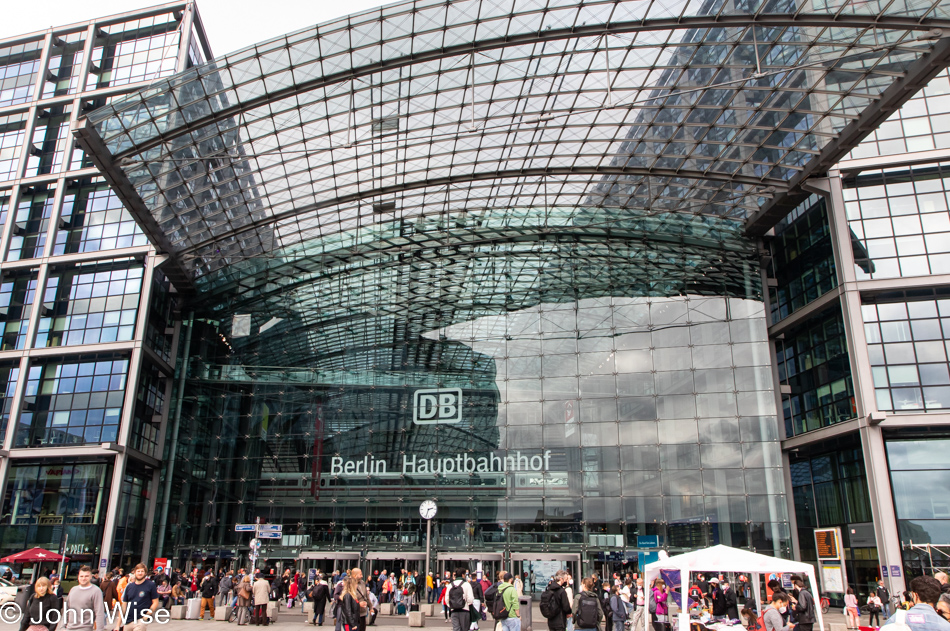
Our brief walk into Berlin is all too quickly over as Caroline and I make a note that we’ll have to return one day to give more study to this vast city.
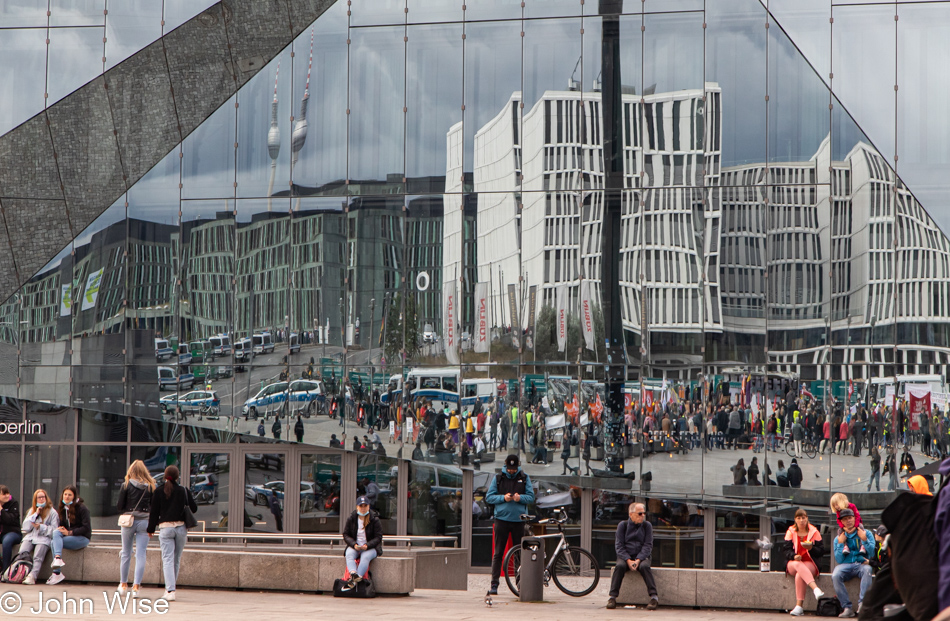
I’ve taken too many photos here, and now I have to find something to write after saying almost everything I could hope to say about a mere hour on the streets of Berlin. Obviously, this glass cube seriously caught my attention.
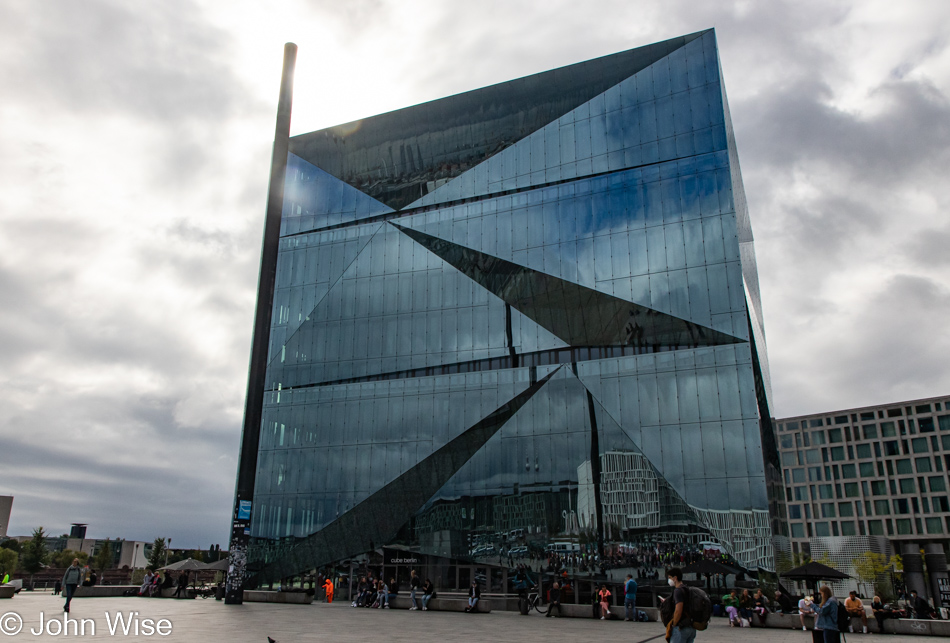
It’s so interesting that I have three different views of it compared to only one for the Bundestag and one for Brandenburg Gate, but those places need more studied viewing and even a tour in regards to the Bundestag.
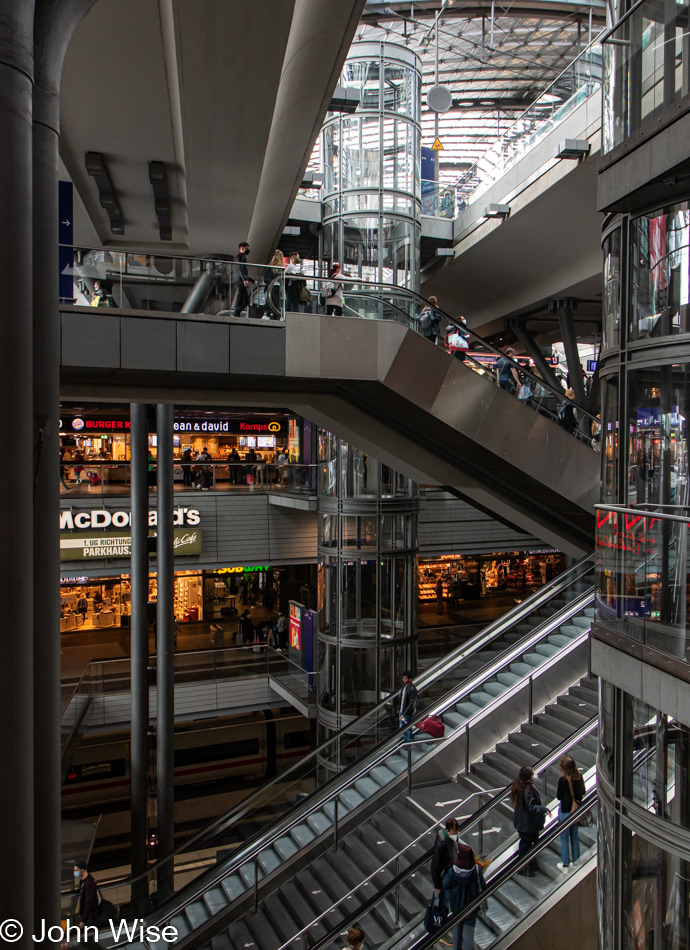
I think I could spend an entire day photographing the various open areas found throughout this train station. While filled with the same brands that populate every train station and airport in Germany, they do not detract so much that I can’t enjoy the beautiful architecture of this modern structure.
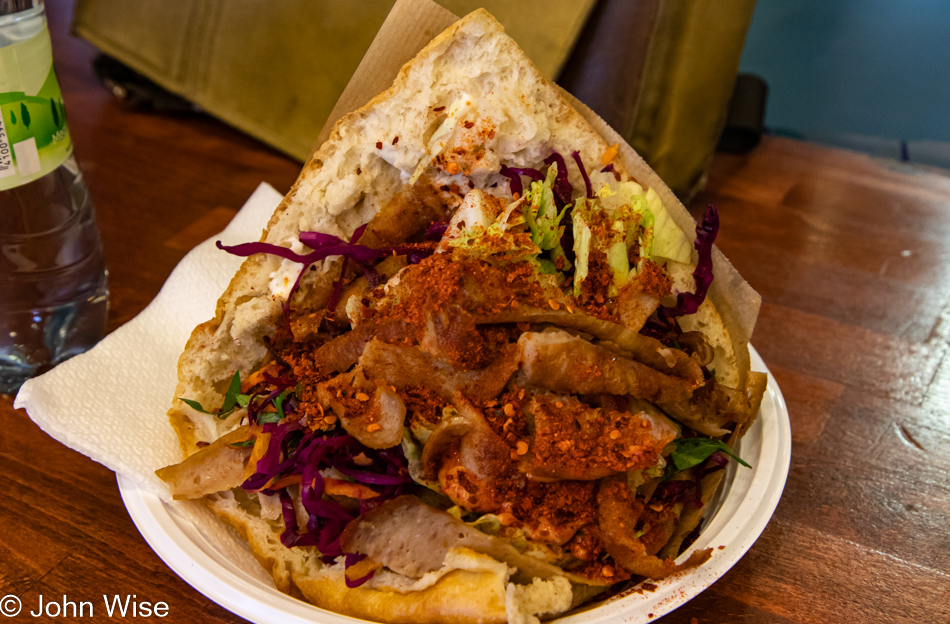
I had a hunch earlier before pulling into Berlin that we’d be eating a döner, and sure enough, I present you Döner mit Scharf. I’m hoping you don’t need me to translate “Scharf,” as you can see all the chili peppers on my popular Turkish sandwich.
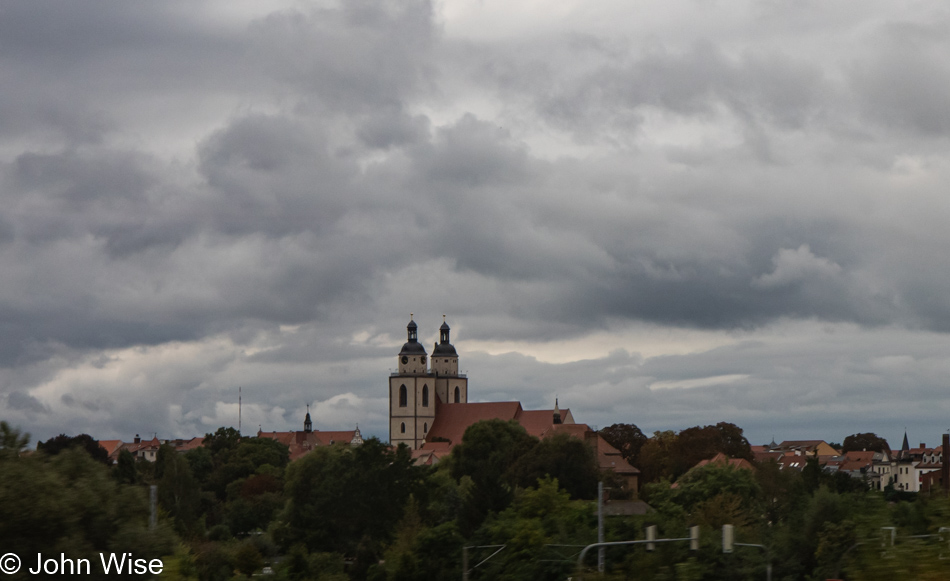
Random towns go by, some with buildings that yank my attention, forcing the camera to the window as we glide by at over 100 mph. I can’t jot down where we are as my focus is on writing, and Google would be slow to respond anyway. No matter as someday, Caroline may very well have the opportunity to visit hundreds of these small towns if retirement goes our way.
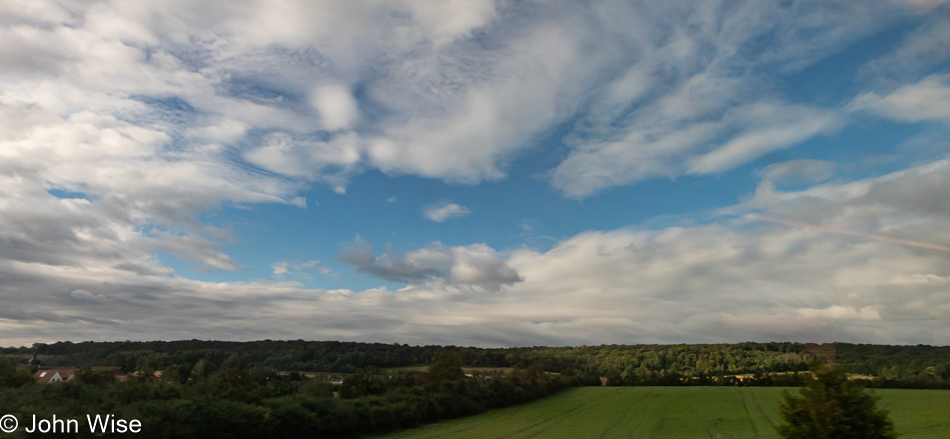
Is this the return of blue skies?

Shooting sunsets through dirty train windows is a challenge, often producing tons of blooming as the light refracts through the glass in such a way that the image sees the trash can before ever finding its way into Lightroom for beautification treatment. Maybe I should point out my go-to settings for image adjustments as it’s usually not a lot. First, I lower the exposure a bit, increase the contrast, lower highlights, and increase shadows. I up the sharpness, hit things with the dehazer, remove some noise, adjust the lens distortion, straighten the horizon, and maybe perform some cropping. That’s really about it, as I don’t have a lot of time to invest in “fixing” images after prepping 20 to 50 images for a blog post and then moving on to writing between 1,000 and 3,000 words for it while still remaining active doing stuff that’s worth photographing and writing about, I simply cannot “Photoshop” my way to perfection.
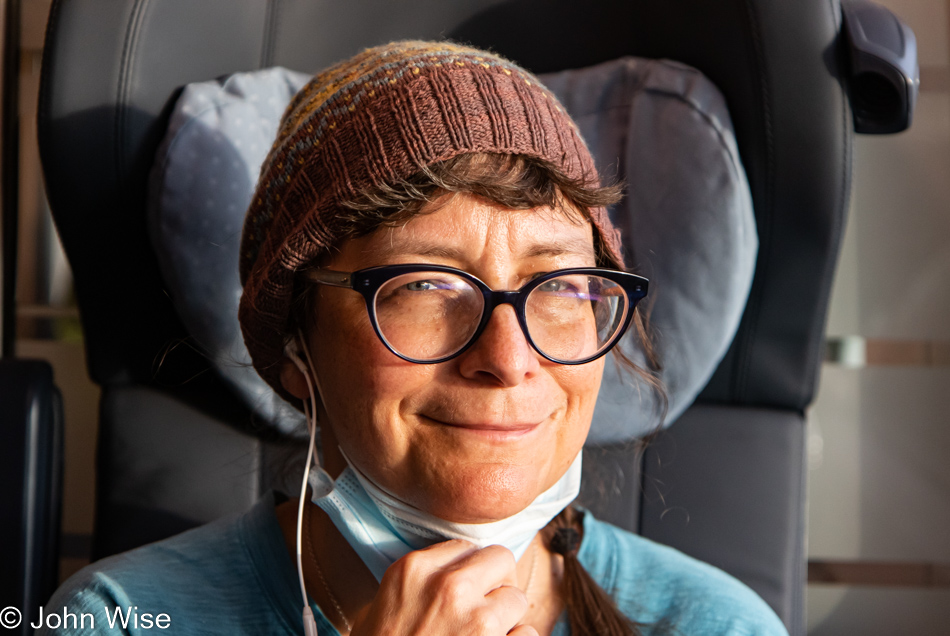
Okay, so I said I had enough of this face on this post. Well, I never get enough of this face, or maybe it’s the eyes, or maybe it’s everything that comes along with Caroline.
It’s 7:20 in the early evening, and we are only about a half-hour from Frankfurt. We’ve been invited by the Engelhardt’s to join them for pumpkin curry that Klaus is cooking up, saving us a trip to a restaurant after 11 hours of traveling from the far north 500 miles away (804 kilometers) back to the center of Germany. If you’ve not gleaned it before, our trip to the sea was nothing shy of perfect, and that’s the last word.